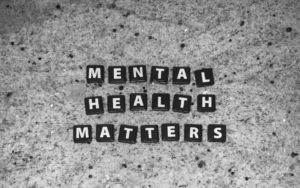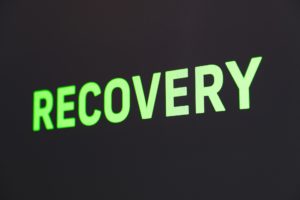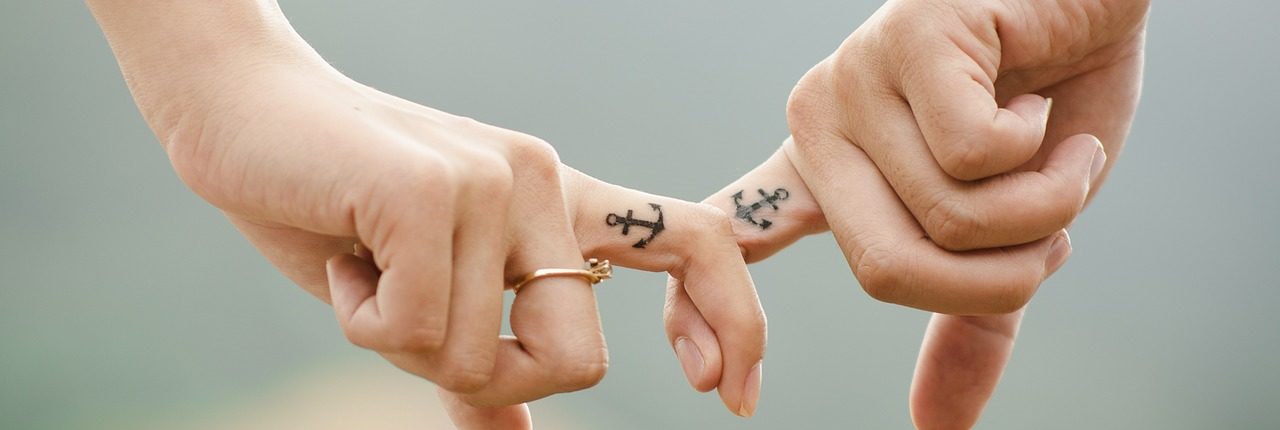Healthy relationships have healthy boundaries. Boundaries in a relationship are life-giving and learning to set healthy boundaries is essential to a happy, healthy, and meaningful relationship. The challenge and a major part of  the codependency recovery process are learning how to do that. In the Bible, when God created humankind, God designed us to be relational beings.
the codependency recovery process are learning how to do that. In the Bible, when God created humankind, God designed us to be relational beings.
In Genesis, He made both male and female in His image, He commanded that they be relational and multiply, He gave them dominion over the earth with what they needed to live and God called it all good (Genesis 1: 26-31) but we also see that God didn’t outline how this would work. In fact, later in the book of Genesis, we will see that Adam does not have a suitable helpmate (Genesis 2:20-25) and so we see that God corrects this through the creation of Eve.
God establishes from the very beginning, that there is a need for healthy, mutual, and meaningful relationships. Codependency undermines this key relationship dynamic. There are some patterns of behavior within codependent relationships that tend to undermine the well-being of the people in them. Santa Monica Christian Counseling provides support for individuals seeking to break free from codependent relationships and foster healthier connections.
What Is Codependency?
The term codependency names what happens when a person focuses so much on the needs of others that they define themselves according to those needs and begin to lose themselves. When you focus on others in that way, the boundaries between yourself and others become blurry and in some cases are dissolved.
Every healthy relationship needs healthy boundaries because that is how two people remain distinct and exist within a healthy relationship system. In a healthy relationship, two people with distinct needs, opinions, and feelings interact. They share thoughts and ideas. They dream together. They become united in purpose and calling.
But codependency subordinates the needs and identity of one person, for the sake of the other. Sometimes this is done in an authoritarian manner and in other cases, the desire for approval, feeling needed, and staying connected can lead a person to unknowingly and unwittingly sacrifice their own personal boundaries and set aside self-care for the sake of the relationship, which is detrimental to the person sacrificing and to the relationship.
Codependency can look like having trouble saying no to the other person or expressing a different opinion. It may also look like consistently putting the needs of others first before your own, and this is not reciprocated. Because of the struggle to say no and meet your own needs, if you’re codependent you’ll find yourself juggling a huge load of obligations and eventually feeling resentful for it.
The desire to fix, help, or rescue others initially makes a codependent person feel needed, wanted, and loved. Over time, it can also leave the codependent feeling anxious, ashamed, tired, worn out, or guilty because their relationships are out of balance. They have been a one-way giving stream and no one person can always meet the needs of another perfectly without also being cared for in the process.
Codependent patterns can occur in many different kinds of relationships – between parents and their children, spouses, dating partners, siblings, friends, and even in the workplace. One of the primary characteristics that define a codependent relationship is the lack of symmetry and mutuality in the relationship. Codependents are the best at over-functioning and they usually do it to themselves.
The Effects of Codependency on Relationships and Personal Well-being
Codependent relationships are unbalanced and unhealthy relationships. Often, a person who struggles with
codependency will find themselves in toxic relationships in which he or she enables the bad behavior of his or her counterpart.
When you struggle with setting boundaries or with people pleasing, the relationship becomes one-sided. One person will be responsible, taking care of the messes made by the other, and making sure that everything stays functioning which enables the other person to sit back and take what they give, avoid responsibility, and/or function in an exploitative manner.
For example, if one struggles with addiction or emotional maturity, the codependent in the relationship may make excuses, not challenge the other’s failings, or take over responsibilities that aren’t theirs to handle. As a result, the emotionally immature person doesn’t grow, and the person with addiction remains stuck because his or her lifestyle is being enabled.
Codependency will often leave the codependent person doing the heavy lifting in the relationship. Codependents are some of the nicest and hardest working people you will ever meet.
The sad part is that even though they derive a sense of purpose from trying to fix others, it is out of balance and the codependent will often end up feeling empty and resentful of those they help and even with themselves. This feeling happens because the codependent person constantly places his or her own life and needs on hold to satisfy the needs of others.
Because of the enormous weight of responsibility involved with ensuring the well-being of others, codependency often brings feelings of anxiety, stress, and even depression. As the codependent person seeks to meet the needs of others before their own, they will often neglect self-care to the detriment of their own mental and physical wellbeing. Being on call to help other people all the time will likely lead to emotional and mental burnout.
Finding Healing from a Codependent Relationship
One of the challenges of codependency in Christian communities is that we are called to love and serve others before ourselves. We are encouraged to be servants and to set our needs aside for the sake of others. This is true. It is also true that we are to have the types of boundaries within serving that allows for continually serving others.
The codependent would rather push themselves to their very limits, risking burnout and suffering harm, rather than not be there for others. Thus, prioritizing others and their opinions above oneself goes way beyond the sacrificial love that Christians are called to biblically and occurs within healthy relationships. Ironically, it ends up being detrimental to the well-being of both people in the relationship.
 To begin recovery from codependency requires an honest evaluation of one’s needs and recognizing that there is a problem. The hardest part behind accepting that one may be struggling with codependency is that it doesn’t seem like it’s a problem. For most people, and especially for believers in Jesus, being kind, helpful, and self-sacrificial is virtuous. So, when is it a problem?
To begin recovery from codependency requires an honest evaluation of one’s needs and recognizing that there is a problem. The hardest part behind accepting that one may be struggling with codependency is that it doesn’t seem like it’s a problem. For most people, and especially for believers in Jesus, being kind, helpful, and self-sacrificial is virtuous. So, when is it a problem?
It is a problem when the fruit of the efforts of the codependent doesn’t produce love, joy, peace, patience, kindness, goodness, gentleness, and self-control. When the person giving is tired, burned out, frustrated, neglected and upset or when the person receiving is becoming more addicted, difficult, entitled, or irresponsible. Codependency is a relational system and even though it may be hard to stop, it can change.
It is important to look out for the needs and interests of others, as passages such as Philippians 2:1-4 encourages us to do, but this does not mean you and your needs cease to exist. Loving others doesn’t mean excusing them from responsibility or making excuses for them. Codependency seems loving and virtuous, but in the end, is not. It denies your limited human capacities and fosters dependence on you instead of cultivating dependence on God.
4 Codependency Recovery Tips
Some tips for recovering from codependency include the following:
1. Recognize your limits.
You are only human. That means you don’t know it all, can’t be everywhere at once, and don’t have enough resources to meet every need or please everyone. Knowing your own limits helps you see that you can’t solve everyone’s problems, and that allows you to take yourself off the hook.
Sometimes the best you can do is just listen and be supportive because you don’t have the answers and can’t fix the problem, and that’s okay. Also, sometimes even being supportive isn’t enough. An abusive or addictive person won’t stop their behavior simply because of your support. In those cases, they need therapy and/or rehabilitation, and that’s something only they can do for themselves.
2. Learn to recognize your own needs.
What you feel matters, as does what you need. When you recognize and acknowledge your needs, you can move to ask for what you need. It’s okay to have needs, and it’s okay to try and meet those needs.
Recovering from codependency will require you to be in touch with your feelings and begin recognizing what you like, what your needs are, and your opinions on certain matters. It also means recognizing that you don’t have all the answers, and you can ask others for help and don’t have to do everything by yourself.
You can and should take care of yourself, and that includes making time for exercise, doing a hobby, spending time with a treasured friend, going for a massage, or anything else that helps you nurture your body, mind, and emotions.
 3. Learn to express your true feelings.
3. Learn to express your true feelings.
It’s okay for you to say no. It doesn’t mean that people won’t like you any longer. Even if it does, that’s something they need to sort out for themselves.
When you say what you mean, it helps there is less room for misunderstanding. Additionally, saying “no” will help you avoid resentment and create room for self-care. If you’re too tired to pick someone up, say so, and know that it’s okay for them to make an alternative plan.
4. Draw healthy boundaries.
It’s important to recognize what is your responsibility and what responsibilities belong to others. Learning to let go of the responsibilities of others is a key step in recovering from codependency. Others need to make their own choices. They can deal with the consequences of those choices, especially if they are a functioning adult.
You can’t control other people and their choices, and that’s something you need to accept for your own good. When you draw a healthy boundary, that also means not wanting to manage what others think of you and not being controlled by those thoughts. When you communicate clear boundaries, that helps to avoid misunderstandings and create a space where you can meet each other’s needs in healthy ways.
Codependency Recovery
It’s helpful to pursue therapy for codependency because the roots of it often go deep and stem from patterns learned in childhood. A Christian counselor can help a person identify codependent behaviors and understand their roots.
Codependency recovery is about finding a balance between meeting our needs and recognizing the needs of others. Therapy can help a person learn how to find this balance and improve relationships with others. For example, drawing healthy boundaries and learning how to be supportive without enabling or trying to fix things for them.
Additionally, therapy can help a codependent person address low self-esteem issues and begin to learn self-compassion. Being kind to yourself about your mistakes is an important part of recovery, as codependents tend to be highly self-critical.
Living to please people is a never-ending and unfulfilling quest. It’s also fruitless because we weren’t designed to be the salve for everyone’s wounds. Only God can meet people’s deepest needs. While He does use us to meet some needs of others, their ultimate dependence is on God, and we shouldn’t feel like we need to carry the weight of everyone’s burdens.
There is a difference between supporting people on their journey and trying to save them. With therapy for codependency, it’s possible for you to have healthy relationships with others and with yourself. If you struggle with codependent behaviors, you can seek help today by reaching out to a counselor at Santa Monica Christian Counseling and making an appointment with a caring Christian counselor.
“Bound by Light”, Courtesy of Anastasiya Lobanovskaya, Pexels.com, CC0 License; “Anchor”, Courtesy of Takmeomeo, Pexels.com, CC0 License; “Mental Health Matters”, Courtesy of Marcel Strauss, Unsplash.com, CC0 License; “Recovery”, Courtesy of Martin Sanchez, Unsplash.com, CC0 License



